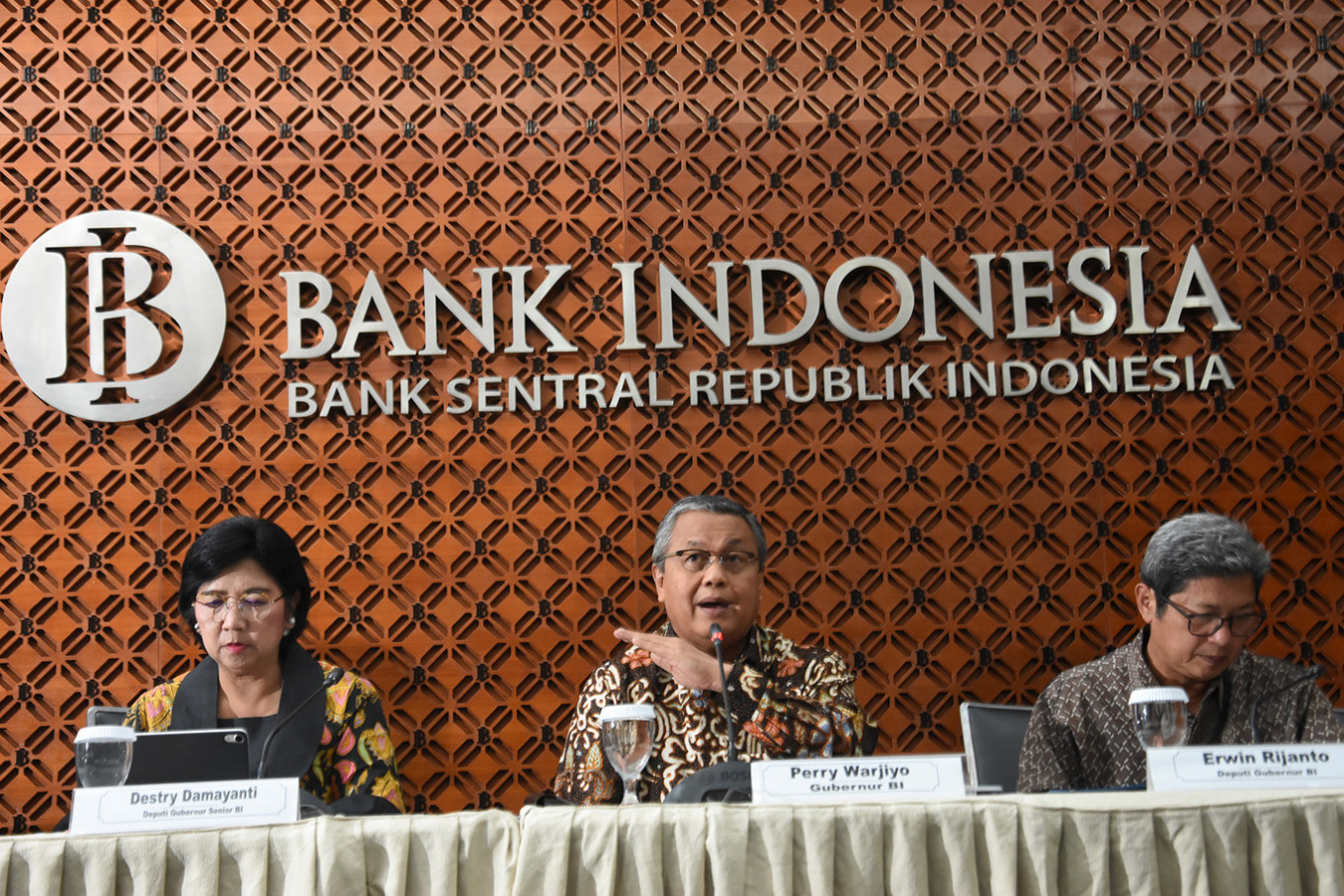Popular Reads
Top Results
Can't find what you're looking for?
View all search resultsPopular Reads
Top Results
Can't find what you're looking for?
View all search resultsBank Indonesia buys US$11.2b in govt bonds to support rupiah, financing needs
Bank Indonesia has bought Rp 166.2 trillion worth of government bonds from foreign investors in the secondary market since early this year.
Change text size
Gift Premium Articles
to Anyone
 Bank Indonesia Governor Perry Warjiyo (center) accompanied by senior deputy governor Destry Damayanti (left) and deputy governor Erwin Rijanto, hold a press briefing on policy measures to maintain monetary and financial stability due to the impact of the health crisis at the Bank Indonesia building, Jakarta, on March 3. (Antara/Indrianto Eko Suwarso )
Bank Indonesia Governor Perry Warjiyo (center) accompanied by senior deputy governor Destry Damayanti (left) and deputy governor Erwin Rijanto, hold a press briefing on policy measures to maintain monetary and financial stability due to the impact of the health crisis at the Bank Indonesia building, Jakarta, on March 3. (Antara/Indrianto Eko Suwarso )
B
ank Indonesia (BI) has bought up to Rp 173.1 trillion (US$11.24 billion) worth of government bonds from primary and secondary markets in a bid to stabilize rupiah and support the government’s financing needs.
BI Governor Perry Warjiyo said the central had bought Rp 166.2 trillion worth of government bonds from foreign investors in the secondary market since early this year amid the decline of the rupiah against the US dollar.
He said the Rp 2.3 billion worth of government debt papers were purchased during the government’s regular auction on Tuesday. This is in addition to Rp 1.72 trillion worth of bonds bought by BI in a regular auction on Tuesday last week and Rp 2.93 trillion bought by the central bank in a "greenshoe option" on Wednesday last week.
“We see that the government’s financing needs will be fulfilled by the market,” Perry told reporters in a virtual press conference on Wednesday, adding that bond investors should not bet on Indonesia selling debt at higher yields, as the amount to be raised for the rest of the year will be manageable and the inflow of foreign funds would push yields lower.
The government on Tuesday raised Rp 16.62 trillion, below the target of around Rp 20 trillion to Rp 40 trillion, despite total incoming bids of Rp 44.4 trillion as investors bid yields that were too high.
"The market will see, at the beginning they bid for yields that were too high, thinking the sum to be raised would be large,” Perry said, suggesting that investors had bet the government would pay higher yields as it would need a large amount of funds to finance the extra spending for COVID-19 mitigation efforts.
The country’s budget deficit is expected to widen to 5.07 percent of GDP this year as the government would have to increase its gross issuance of debt to Rp 1.4 quadrillion this year to finance the COVID-19 mitigation and rescue program, according to Perry.
However, Perry says, the central bank sees only Rp 425 trillion in bond offerings for the rest of 2020 as the government maximizes spending from other sources, including its own cash, as well as loans from development banks, among others.
The government plans to provide another Rp 35.3 trillion in new tax incentives for 18 sectors, including those hardest-hit by the COVID-19 pandemic, such as tourism and the food and beverage sector.
This is on top of the Rp 436.1 trillion stimulus packages previously announced by the government to strengthen social safety nets, boost healthcare spending and for economic recovery programs.
The government raised another Rp 62.62 trillion from government debt papers on Monday and seeks to secure $750 million in loans from development banks, according to Finance Minister Sri Mulyani Indrawati and Finance Ministry data.
Previously, Indonesia had raised $4.3 billion in dollar-denominated bonds, including the longest-dated 50-year dollar bond ever issued by an Asian nation, earlier this month. It also sold around Rp 14 trillion in sharia sovereign bonds last week.
By early May, BI will have injected a total of Rp 503.8 trillion in additional liquidity to banks and the financial system to help cushion the economic impact of the virus outbreak and to strengthen the rupiah as part of its quantitative easing measures.
The rupiah gained against the greenback over the last few weeks, strengthening to Rp 15,394 per dollar as per 11 a.m. on Wednesday from this year’s low of 16,625 per US dollar, according to Bloomberg data.
The currency has depreciated as much as 18 percent this year before bouncing back to the current level as the central bank moved to support the rupiah by buying government bonds from foreign investors as they dumped Indonesian assets over fears related to COVID-19.









